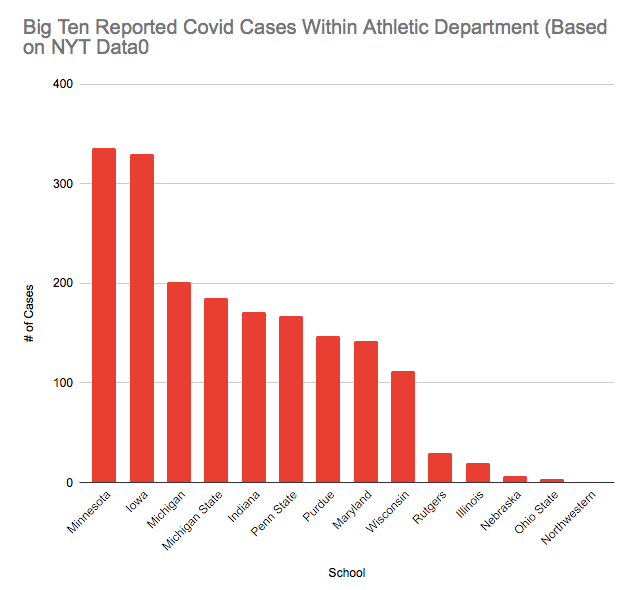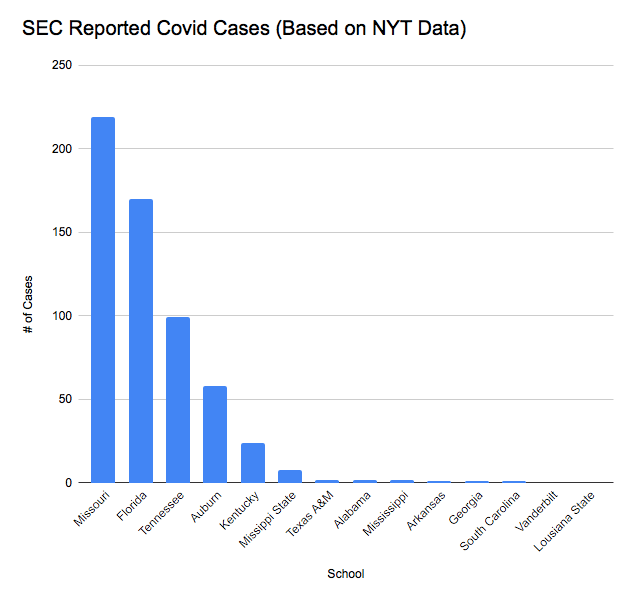This spring and summer as many colleges and universities decided that their Spring 2020 courses would be offered either completely online or in a hybrid format, many Southeastern Conference(SEC) schools, in particular the University of Georgia, were devastated at the thought of losing a fall football season. Despite controversy over whether the stadium could implement Covid-19 protocol that would safely accommodate spectators and players, the university decided to continue to hold a regular football season, keeping Sanford stadium and 25% capacity and playing only in-conference games.
Capping Sanford Stadium, at a fraction of its regular size, comes with a heavy price. According to a Savannah Morning News by journalist Marc Weiser, UGA’s athletic director revealed that the University of Georgia is expected to lose around $55 million as a result of this change. Football at most SEC schools is more than a sport, but an economic necessity. UGA Kinesiology professor, Dr. Steven Salga, indicates that the school’s football program alone generates over $100 million per year and that because of this, the athletic department will have to “get more creative moving forward with attempting to identify and maximize additional revenue sources” to make up for this financial loss. An example of one of these “creative” solutions that UGA and other schools have been implementing is the use of cardboard cut-outs of spectators in seats that are required to be empty following safety standards. According to the Athens Banner-Herald, proceeds from fans buying personalized cut-outs go to the COVID-19 UGA Athletics Fund that covers NCAA, sanitation, healthcare, and scholarship expenses for athletes.
Though $55 million may seem like a staggering number, the athletic department and administration have maintained an impressive reserve fund for unprecedented times such as these. In a financial Q&A interview by Brandon Sudge of the Telegraph, he interviews UGA athletic director, Greg McGarity, who explains that the university has a total of $102 million in the reserve funds. Back in April, the University still had $17.9 million of this amount allocated for the rest of the school year. McGarity explained that this money covered “fixed expenses” such as salaries for coaches, insurance, and utilities. Eric Jackson, a sports business reporter for the Atlanta Business Chronicle, has been covering the changes and ramifications for SEC schools, including the University of Georgia, calls UGA “unique” for having low debt and funding from donors that allows the school to “absorb the hit” that many other colleges and universities continue to face.
With football being a huge source of funding for other teams within the SEC, players and coaches of these smaller sports experienced concern regarding major budget cuts, scholarship loss, or even total loss of funding for their sport. Most of these smaller sports that typically generate less revenue for universities were not even sure that they were going to be allowed to have a season until their football programs decided to proceed with a season. An impressive feat that was revealed to the public during McGarity’s board meeting was that the UGA athletic department did not have to terminate a single program or lay off any coaches or athletic department employees due to Covid-19. Dr. Salga explains that one of the reasons that the university could accomplish this lies in the fact it doesn’t offer many additional sports outside the requirement set by the NCAA. Schools outside of the SEC such as Stanford, East Carolina, and University of Connecticut are a few that experienced more cuts because of a greater diversity in programs. In addition to this, Eric Jackson points out that UGA sports programs aren’t funded by athletic fees in student tuition which is why “even if enrollment declines, it won’t impact the programs as much as it would at [other schools].”
Even though McGarity has committed to maintaining all sports teams this year, he has made it clear that the athletic department will also be maintaining an attitude of frugality. One of these changes to save money has been cutting back on transportation costs. “The biggest financial cut this year is that we drove everywhere…we didn’t fly at all,” says Shadi Mohammed, a sophomore member of the women’s soccer team. Mohammed explains that, for example, they normally would have flown to their game against the University of Mississippi, but the attitude of her team is “whatever football is doing, we’re pretty much doing.” Jamie Hunt, associate head coach for the men’s tennis team, has been having similar experiences to Shadi in that his team drove everywhere and limited away matches, but both individuals still express the same gratitude. “ This year the men’s team only played in three events this year, but that they are “so thankful to play in those three because there are a lot…of schools that weren’t able to play at all.”
Practices and social life for these athletes have looked very different compared to last year for UGA athletics, as well. In an interview with a senior runner for the women’s track team, who requests anonymity, she explains that the team trains in small groups, attempts to social distance as much as possible, and wear masks except for when they are actually running or exercising. She commends staff for making practices as normal as possible and for not making any noticeable cuts to the gear or food she receives, but that there is “a clear expectation” for following the rules and CDC guidelines. The runner interacts with non teammates at an absolute minimum because if she were to spread the virus to teammates training for the Olympics, “who knows what kind of impact [that] could have on them.” Keeping each other safe and accountable may be difficult, but the track team will continue to practice with hopes that their spring season won’t be postponed.
Even though the University of Georgia has been expected to lose an impressive $55 million that will cause alterations in budgeting and sources of revenue, the general consensus from professionals seems to be that Georgia has fared well on a national and conference level. Dr. Welch Suggs, associate professor in Georgia’s school of journalism, believes that not cutting non-revenue sports comes at a price of lack of transparency. Suggs says that he is “extraordinarily concerned with the lack of information that UGA has made available” and referenced an New York Times article that the UGA athletic department has only reported one Covid-19 case. One student athlete interview, whose sport and identity will remain anonymous, mentioned that they knew nine people who had tested positive on her team, while Suggs claimed he also knows “many more firsthand” within the athletic department. Though it is clear that players and coaches work extremely hard to stay safe, this data indicates that UGA and other schools in their conference have been more successful in maintaining their sports programs as a result of choosing to test players less. Despite controversy on how university athletics should be handling the pandemic, UGA, like the rest of the country, has accepted the fact that money will be lost this year; but coaches and players will continue to follow the school’s protocol and work just as hard as any other season.




